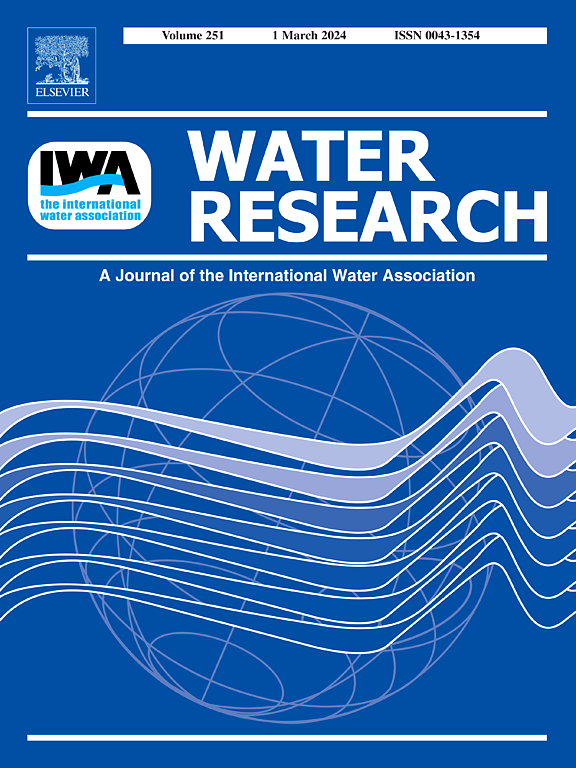以机器学习为指导,对用于硼回收的正渗透聚合物膜进行性能预测
IF 11.4
1区 环境科学与生态学
Q1 ENGINEERING, ENVIRONMENTAL
引用次数: 0
摘要
硼的高效回收是可持续提取水资源的重要策略之一。然而,如何有效预测地下水、地热水和海水等非常规水资源中硼的采收率仍然是一个关键的技术挑战,在公开文献中仍然很少涉及。为了有效地解决这一问题,本文提出了一种有效的策略来精确预测硼的回收性能,然后通过具有更好模型性能的先进机器学习技术来探索正向渗透过程的机制。具体来说,为了探索各种硼采收率因素之间的复杂关系,我们比较了三种先进的机器学习回归模型,以提供有价值的见解,了解这些关键因素如何影响系统性能。研究发现,pH、硼浓度和膜取向三个关键驱动因素显著影响正向渗透过程中硼的回收性能。结合粒子群优化算法的XGBoost模型预测精度最高,r平方值高达95.4%,显示了XGBoost模型对硼采收率的精确预测能力。利用该混合模型对搜索空间进行优化后,正向渗透系统的整体性能得到显著提高,预测硼截除率高达98.28%,优于文献报道值。我们的工作证明了先进的机器学习在有效预测硼采收率以改善水质和资源回收应用方面的强大潜力。本文章由计算机程序翻译,如有差异,请以英文原文为准。


Machine learning-guided performance prediction of forward osmosis polymeric membranes for boron recovery
Efficient recovery of boron is one of the crucial strategies of sustainably extracting valuable resource from water. It however still remains a key technological challenge to efficiently predict boron recovery from unconventional water resources such as underground water, geothermal water and seawater, which are still few concerned in open literature. To effectively address this issue, herein we propose an efficient strategy to precisely predict boron recovery performance and then explore mechanism in forward osmosis process via advanced machine learning techniques with better model performance. Specifically, to explore the complex relationships among various boron recovery factors, we compare different advanced machine learning regression models to provide valuable insights into how these key factors impact system performance. We find that three key driving factors (i.e., pH, boron concentration, and membrane orientation) significantly affect boron recovery performance in the forward osmosis process. The best prediction accuracy with a high r-square (R2, 95.4 %) is achieved via the XGBoost model combined with the particle swarm optimization algorithm, demonstrating its remarkable ability for precise boron recovery prediction. By employing this hybrid model to optimize the search space, the overall performance of forward osmosis system was significantly enhanced, with a predicted boron rejection rate as high as 98.28 %, outperforming the reported values. Our work demonstrates the powerful potential of advanced machine learning for efficiently predicting boron recovery for water quality improvement and resource recovery applications.
求助全文
通过发布文献求助,成功后即可免费获取论文全文。
去求助
来源期刊

Water Research
环境科学-工程:环境
CiteScore
20.80
自引率
9.40%
发文量
1307
审稿时长
38 days
期刊介绍:
Water Research, along with its open access companion journal Water Research X, serves as a platform for publishing original research papers covering various aspects of the science and technology related to the anthropogenic water cycle, water quality, and its management worldwide. The audience targeted by the journal comprises biologists, chemical engineers, chemists, civil engineers, environmental engineers, limnologists, and microbiologists. The scope of the journal include:
•Treatment processes for water and wastewaters (municipal, agricultural, industrial, and on-site treatment), including resource recovery and residuals management;
•Urban hydrology including sewer systems, stormwater management, and green infrastructure;
•Drinking water treatment and distribution;
•Potable and non-potable water reuse;
•Sanitation, public health, and risk assessment;
•Anaerobic digestion, solid and hazardous waste management, including source characterization and the effects and control of leachates and gaseous emissions;
•Contaminants (chemical, microbial, anthropogenic particles such as nanoparticles or microplastics) and related water quality sensing, monitoring, fate, and assessment;
•Anthropogenic impacts on inland, tidal, coastal and urban waters, focusing on surface and ground waters, and point and non-point sources of pollution;
•Environmental restoration, linked to surface water, groundwater and groundwater remediation;
•Analysis of the interfaces between sediments and water, and between water and atmosphere, focusing specifically on anthropogenic impacts;
•Mathematical modelling, systems analysis, machine learning, and beneficial use of big data related to the anthropogenic water cycle;
•Socio-economic, policy, and regulations studies.
 求助内容:
求助内容: 应助结果提醒方式:
应助结果提醒方式:


